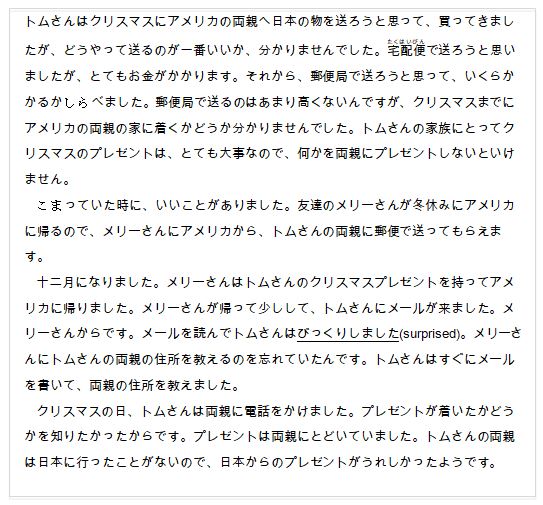Jemand hatte mir die Geschichte schon erzählt.
Schreiben Sie die Aktivsätze in Passivsätze um und behalten Sie (keep) dabei die Zeitstufe (tense), die im Aktivsatz verwendet wird.
Das Problem wurde diskutiert / ist diskutiert worden, aber eine Lösung konnte nicht gefunden werden / aber es konnte keine Lösung gefunden werden.
You might also like to view...
Why did Tom call his parents on Christmas day?

a) because he wanted to celebrate Christmas with his parents on the phone.
b) because he wanted to let them know that their packages were on the way.
c) because he wanted to let them know that Mary would send their packages for him.
d) because he wanted to know if his parents received their Christmas presents or not.
In the following sentence, which word serves as the subject? English is my favorite subject
a. English b. my c. favorite d. subject
Secuencia de tiempos. Escoge los verbos entre paréntesis correctos para completar este párrafo. Me habría gustado que tú (1. hayas viajado / hubieras viajado) conmigo a Machu Picchu. Es un lugar increíble. Es sorprendente que las edificaciones (buildings) (2. se hayan mantenido / se hubieran mantenido) casi intactas en todo este tiempo. Los incas fueron sin duda muy buenos arquitectos. No creía que (3. fuera / sea) posible construir una ciudad en esa geografía. Por eso, no es extraño que Machu Picchu (4. hubiera sido / sea) un lugar muy visitado por turistas de todo el mundo. Afortunadamente, un amigo me había aconsejado que (5. haya llegado / llegara) muy temprano para evitar a la mayoría de los turistas. Por eso, le insistí a mi guía turístico que (6. tomáramos /
tomemos) el primer tren. ¡Fue una muy buena decisión! Recuerdo que cuando era pequeño yo quería que mis padres me (7. llevaran / lleven) a Machu Picchu, pero no teníamos mucho dinero para hacer ese viaje. Mi padre siempre me decía: «Te pido que (8. hayas sido / seas) paciente. Algún día harás ese viaje». ¡Todavía no puedo creer que lo (9. haya hecho / hiciera)! Espero que tú (10. pudieras / puedas) ir pronto.(10) Fill in the blank(s) with the appropriate word(s).
Roger weiß nicht /(whether) / nächstes Jahr ist er wieder gesund Roger weiß nicht,
What will be an ideal response?